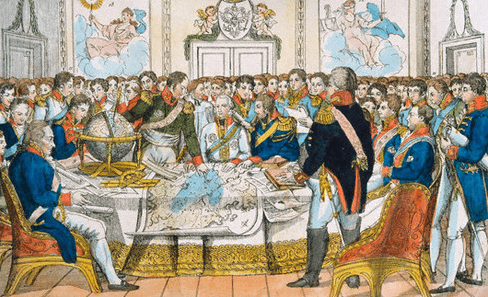Description
Organized by David Armitage (Department of History & CES, Harvard) and Stella Ghervas (CES, Harvard & MSHA, Bordeaux)
2014-15 will mark the bicentenary of the Congress of Vienna, a significant step in the transition from the Ancien Régime to a new international order in which peace was largely maintained through diplomatic dialogue. This post-Napoleonic period has previously been the subject of major works by scholars of international relations and comparative politics (notably the classic studies of Henry Kissinger and Paul Schroeder). Yet many national histories still portray the Congress as a mere “reaction” by conservative monarchs, heralding a time of political and social regression.
More recent works, written from a transnational and even a global perspective, have done much to revise these traditional views. They have also expanded the range of approaches to include cultural history, intellectual history, the history of gender and the history of slavery. The resulting picture has become far more complex and nuanced, bringing new themes and issues to the fore.
The Center for European Studies (CES) at Harvard University will host a conference to cover these advances in our understanding of this epoch. It will seek to dust off traditional narratives by examining a central paradox: if we admit that the conceptions of peace and political order behind the Vienna Settlement ushered in a truly innovative international system for Europe and the wider world, how could these same ideas and the statesmen who bore them also have been reactionary, as they have so often been portrayed? While the Great Powers were at the center of attention, how did their decisions affect the smaller states of Europe, the stateless peoples, the enslaved, and their colonies, as well as extra-European states? What was the role of women in these diplomatic negotiations? More generally, is there good cause to reconsider our views about the Congress of Vienna from our horizon of experience, in the perspective of the longue durée? By bringing together four leading scholars on the Congress (from Europe, the United States, and Australia) to address these questions, this conference will showcase the most innovative new work in the field. And by virtue of being the first conference of the bicentenary, it should help to set the agenda for subsequent considerations of the Congress in the coming months.
The intended audience is faculty and students in history, politics, International Relations, and European studies broadly defined.

